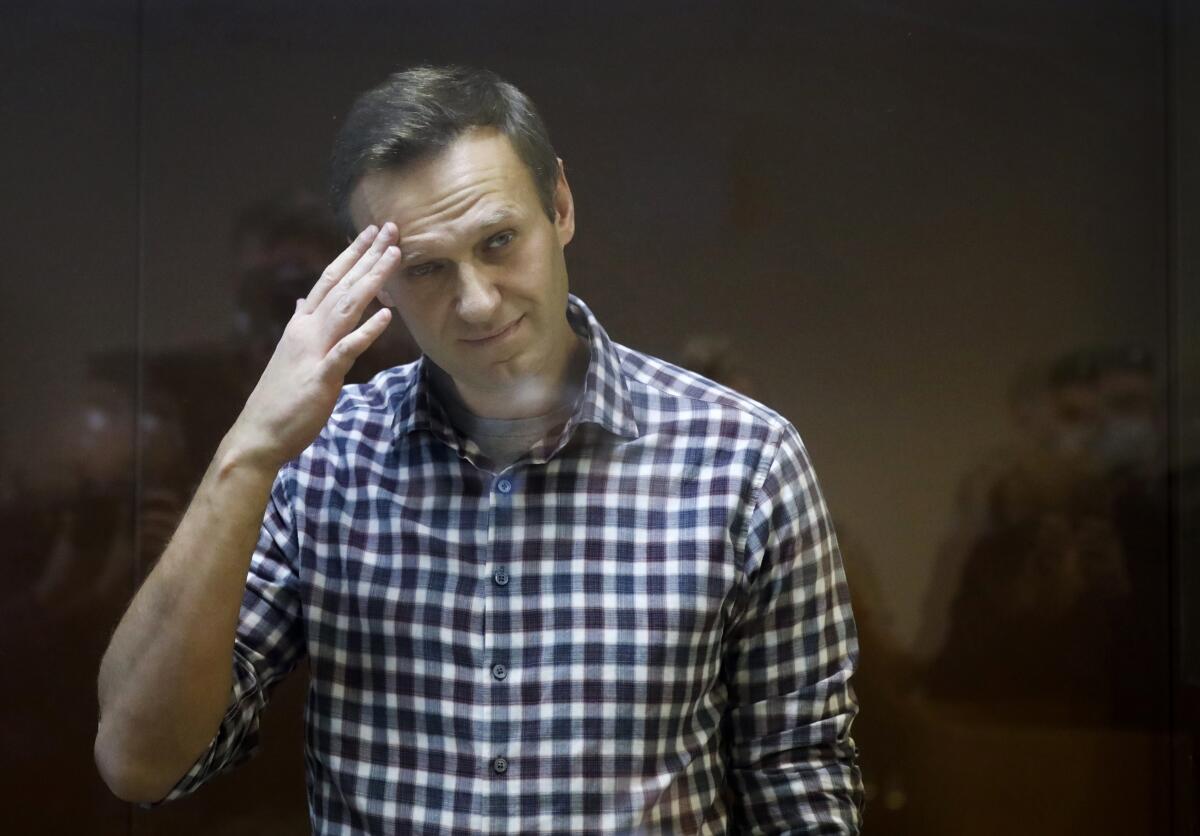Russia opposition leader Navalny’s health worsens in prison

- Share via
MOSCOW — Russian opposition leader Alexei Navalny has accused prison authorities of failing to provide proper treatment for his back pain and leg problems, saying in a letter posted Thursday that his physical condition has worsened in prison and he now has trouble walking.
Navalny blamed his health problems on prison officials failing to provide the right medicines and refusing to allow his doctor to visit him behind bars. He also complained in a second letter that the hourly checks a guard makes on him at night amounted to sleep deprivation torture.
Copies of his letters to penitentiary officials and Russia’s top prosecutor were posted on Navalny’s website.
The 44-year-old Navalny, who is President Vladimir Putin’s most outspoken opponent, was arrested Jan. 17 upon his return from Germany, where he spent five months recovering from a nerve-agent poisoning that he blames on the Kremlin. Russian authorities have rejected the accusation.
Last month, Navalny was sentenced to 2 ½ years in prison for violating the terms of his probation while convalescing in Germany. The sentence stems from a 2014 embezzlement conviction that Navalny has rejected as fabricated — and which the European Сourt of Human Rights has ruled to be unlawful.
“My condition has worsened. I feel acute pain in my right leg, and I feel numbness in its lower part,” Navalny wrote in the letter. “I have trouble walking.”
He said that the authorities have given him standard pills and ointment for his pain, but have refused to accept medicines earlier prescribed by his doctor.
He accused prison officials of undermining his health with a “deliberate denial of due medical assistance.”
Russia’s Federal Penitentiary Service said earlier Thursday that Navalny had undergone medical checkups the previous day, describing his condition as “stable and satisfactory.”
But Navalny’s lawyer, Olga Mikhailova, said Thursday after visiting him in prison that “his right leg is in terrible shape.”
Mikhailova said on Dozhd TV that Navalny was taken to a hospital outside his prison on Wednesday for magnetic resonance tomography but wasn’t given the results.
She said Navalny had experienced back pain for four weeks, but prison officials also would not permit a visit by his doctor. The lawyer argued that authorities should transfer Navalny to Moscow so he could get better treatment.
Navalny’s wife, Yulia, said on Instagram that she doesn’t trust the prison medics, and she called on authorities to let doctors who have her and her husband’s trust in to see him. She said prison authorities refused to accept a note from Navalny’s doctor prescribing some exercises to ease his back pain.
She denounced the treatment of her husband in prison as part of Putin’s “personal revenge.”
Putin spokesman Dmitry Peskov told reporters that the Kremlin wasn’t following Navalny’s condition, referring questions to the penitentiary service.
This month, Navalny was moved to a prison colony in Pokrov in the Vladimir region, 53 miles east of Moscow. The facility stands out among Russian penitentiaries for its particularly strict regime that includes routines like standing at attention for hours.
In a note this month, Navalny described the prison, IK-2, as a “friendly concentration camp.” He said he hadn’t seen “even a hint at violence” there but lived under controls that he compared to George Orwell’s “Nineteen Eighty-Four.”
Navalny, whom prison authorities had earlier marked as a flight risk, said he was subject to particularly close oversight, including a guard waking him up every hour at night and filming him to demonstrate he is in the required place.
He complained about the practice in a separate letter to the chief of the penitentiary service and the top prosecutor that also was released Thursday, saying that the hourly checks amount to “sleep deprivation torture.”
Navalny’s arrest in January triggered a wave of protests that drew tens of thousands of participants across Russia. Authorities detained about 11,000 people, many of whom were fined or given jail terms ranging from seven to 15 days.
Navalny’s associates called earlier this week for another mass protest across the country to demand his release from prison. They urged Russians to sign up for a protest on an interactive map and said they would set a date when the number of people willing to take part reaches at least 500,000.
More than 250,000 have registered on a dedicated website since it opened Tuesday.
Russian officials have rejected demands from the United States and the European Union to free Navalny and to stop the crackdown on his supporters.
More to Read
Sign up for Essential California
The most important California stories and recommendations in your inbox every morning.
You may occasionally receive promotional content from the Los Angeles Times.










